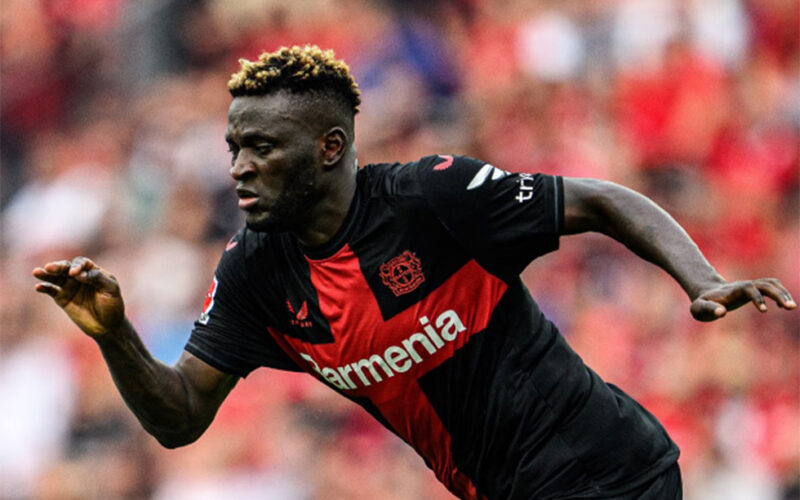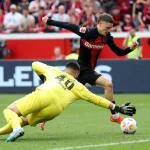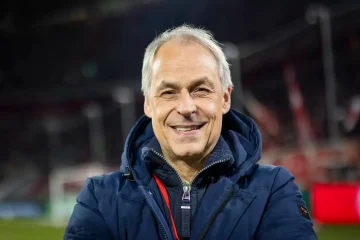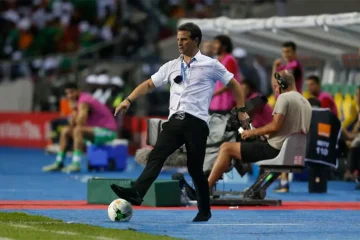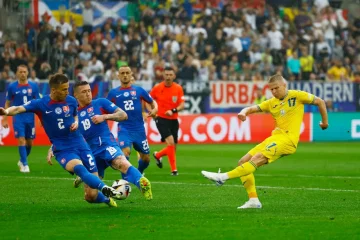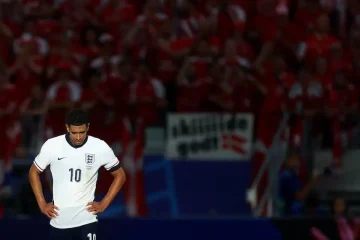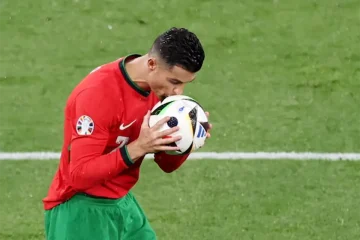WITH two Bundesliga goals and one assist to date, Victor Boniface has made a flying start to his Bayer 04 Leverkusen career.
The 22-year-old Nigerian striker, formerly at Norwegian club Bodø/Glimt, had only switched to Belgian first-division outfit Royale Union Saint-Gilloise in the summer of 2022 before moving to Leverkusen this summer, where he also scored on his German debut in the DFB-Pokal. The two goals he contributed to the 3-0 win against Borussia Mönchengladbach on Matchday 2 were a foretaste of things to come as a new Bundesliga season takes shape.
Having played street football since his early childhood, Boniface knew he wanted to be a professional footballer when he was just six or seven, and joined the local football academy while still at primary school. Times weren’t always easy for a kid away from home, but his determination made him persist, he said.
Joining the junior national team set-up before he was 17 was a key step that led almost directly to his Norway engagement. While the cold climate in Scandinavia came as a shock, it didn’t take the young player long to adjust and get his first contract.
Praised for his clever movement and ability to lose his marker, the young striker has always earned the trust of his coaches quickly and feels perfectly at home in Leverkusen already. His self-description reflects his playing style: “I never doubt myself. I want to learn and be perfect. I learn every day.”
The following is the full interview with this amazing young talent.
Can you tell me the history behind you having a Leverkusen jersey before you even came here?
During the European game we played, I switched jerseys with Rob (Andrich). Since then, I have had it. Sometimes, I go to the gym or train with it. When I am in Nigeria, I play street football, so I use the jersey to play. It was in the first game. We didn’t talk much. I just agreed with him to switch jerseys.
How does it feel to be here in Leverkusen after having played them in the Europa League last season?
It has been good. Leverkusen is a top team. Every young football player, dreams of playing in the top leagues. The Bundesliga is a top league, and Leverkusen is one of the top teams, so it is good.
What’s it like training with world champion Xabi Alonso?
Xabi is, apart from being a coach, a nice person to work with. I enjoy working with him. Even before I came to sign, while we didn’t speak, he spoke positively about me after the first game. For me, it is good for me.
What are your first memories of playing football?
I think, right from when I was little. I cannot remember at what age I started playing football, but I know I started early. I had support from my family and friends around me. My friends and I grew up together so we used to play street football I think I started taking it seriously quite early, and I knew I wanted to play football at like six, seven, or eight years old. Since that early time, I knew I wanted to play football.
Did you start playing on the streets or in a club?
I lived in a military barracks, so I lived with my grandparents. My grandpa was in the military there. We grew up on a military base, so we played street football there. I had school outside the military base. I remember when I started school, the juniors played football against the seniors. So, when I played the game, I was seen by the coach. From there, I joined the academy.
Did you have to leave your family back then?
Yes. I played in the local academy but then had to leave my family after high school. Leaving school was no problem because they knew I wanted to play football, so I didn’t bother to go to high school and university because I told them my plan: once I was done with secondary school, I would be ready to play football. They agreed on that. After high school, I went to another city—to another football academy and I started playing there.
How old were you when you left your family?
I think maybe fourteen, fifteen, or sixteen. Something around this age.
Was it easy for you to be on your own?
It was not easy, but at the same time, it was not just me. There were people from different cities in Nigeria, about 30, 40 young players. It was not easy, but it was not far from where my family lived. During the weekends, I often went to see them. It was just an hour’s drive from where my family lived.
Who was our biggest influence? Your biggest role model?
Like I said, I used to live on a military base. There was a soldier, in my neighbourhood. He was a really fantastic football player. Unfortunately, he didn’t make it to football, so he joined the military. When the soldiers went to play, he sometimes took me to play with them when I was young. Not always playing, but watching them. He was a really good, fantastic player, so in the evenings, at home, we played one-touch, two-touch. I learned a lot from him before I grew up, and then I started doing my thing.
Do you remember his name?
I used to call him ‘Jasper’.
Did playing against older guys shape you in a way?
Yes, yes because I have my brothers—my uncles, I call them my brothers—they were older than me, but I was already joining them when I was 12. I joined them to play so that I could get more confident.
How did things change when you played for Real Sapphire?
It was difficult, but at the same time, it was good. We were 40 or 50 – I remember the first time we got there, there were five from my city. The first three went back because they did not feel comfortable, but, I had this determination because I wanted to play football. I was there for two or three years, you know? From there, I went to the national team. I was already in the national under-17 program during that time. From there, I went to the under-20 national team, so I was in the academy for three years.
So, this was like the start of your career as a professional?
Yes, yes, it was a stepping stone because it was better than where I came from, so I was with them. We had a good coach. A coach from Argentina. It was really good for me there.
How did it come about that you ended up in Norway?
In the academy, they had one senior player before me. He was playing in Latvia. They sold him from Latvia to Norway. The agent who made the arrangements is my agent today. The owner of my academy said to him: “Okay, you saw this guy in Europe, but we also have good players from Nigeria”. My agent came with a scout from Norway. We played a small tournament, and I was selected, so I flew to Norway for a tryout.
What was it like moving from Nigeria to Norway?
I think it was during January and February, and Norway was very cold then. First, I went to Valerenga. I was there for two or three weeks. I didn’t sign because it seemed that the coach didn’t think I was good enough, so I spoke to my agent and they said, ‘It is no problem, we will take you to a different team here’.
Then I went to Bodø/Glimt. I trained one day, and then we had a game the next day. I played the game—I think I played in the first half, and I scored two. I was substituted at halftime, so after the game, I was worried that maybe I hadn’t performed well, but my agents said, ‘No, they like you, they just don’t want you to finish the game. Maybe you score more goals, and maybe bigger teams might want you!’ I was there for a week, and then I signed for Bodø/Glimt.”
Did you have any doubts? Or were you full of confidence?
No, I never doubted myself in Norwegian football. I was always 100% focused because this is what I wanted to do. I always wanted to play football, so I never doubted.
What was the step from Norway to Belgium like?
I was playing really well in Norway, but unfortunately, I got injured, so I didn’t play as much, so I moved to Belgium. Union (Royale Union Saint-Gilloise) is like Bodø/Glimt. Both are smaller clubs that have been doing really well in the last four or five years. When I came to Union, I spoke to the coach and he told me the way they play. He gave me confidence, and I liked the way they played. When I came, it was easier for me because I had the confidence of the coach and the team, too.
How is your confidence keeping up since you’ve moved to Leverkusen?
The first training session, the intensity was really high for me just because of the medical and the fact that we had to travel to Austria. I spoke to the coach, and I told him everything was great. I liked it already. This is what I took with me. I never doubt myself. I want to learn and be perfect. I learn every day.
Do you want to help Leverkusen make this season a more competitive Bundesliga title race?
Everybody has a different opinion about who is the best in the league, but the most important thing is to keep the team doing what we have been doing. Try to win every game and get a good result. For me, that is the most important thing. For me, I don’t really care what people think about who is going to win the league or who is going to do this or that. For me, I just focus on myself and the team.
How do you rate the Bundesliga compared to your previous leagues?
I really rate the German league highly. The quality, the pitch, the fans, the stadium, and the players are really top-notch compared to the leagues I played in before.
What was key to adjusting to the new intensity in the Bundesliga?
My confidence. I believe in myself, you know. There is no doubt about my talent. I have the confidence to do the best for myself.
How many goals would you like to score?
Me? I don’t think about how many goals I want to score at the end of the season. I just want to have a good season and try to help my team.
How is it that the newly formed team performs so well together in such a short time?
I think you have to give credit to the coaches because bringing new players to the team is not easy and adapting is not easy, but I think they made the right choice in bringing the type of players together that suit the way they want us to play. Mentioning just one – to have a player like Granit (Xhaka) and his experience is really good for us. You can see that he plays in every game. He is a big influence on the team.
Who is your go-to guy in the locker room?
Me and Jeremie (Frimpong). Before I even came to Leverkusen, we spoke with each other. Also Edi (Tapsoba). But I think, almost everyone in the team.
What are you like in the locker room?
I think I am one of the funniest guys on the team because I try to make jokes all the time. We always have to laugh, of course.
You will possibly get nominated for the Nigerian national team – are you excited?
Yes, it is every footballer’s dream to represent their country, but we will see what happens. I am focusing on the game on Saturday. After that, we will see what happens.
Sports Network Africa is a partner of bird story agency

